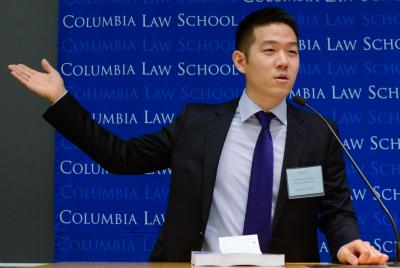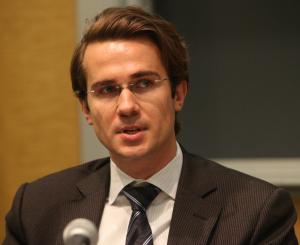Columbia International Arbitration Association Hosts Annual Conference
Experts From Academia and the Legal Profession Discuss Remedies and Enforcement Options in International Arbitration
New York, March 26, 2013—More than a dozen experts gathered recently at Columbia Law School’s fourth annual Columbia Arbitration Day to highlight the state of enforcement of arbitration rulings and the remedies available to parties in the international arbitration setting.
Student members of the Columbia International Arbitration Association organized the March 8 event, led by co-chairs Niklas Elofsson ’13 LL.M., Philip Lee ’13, Åsa Lidefelt ’13 LL.M., and Karima Sauma ’13 LL.M. The annual conference has increased in popularity since its inception in 2010.
“Traditionally, we have seen remedies focus on monetary payments,” said Anthea Roberts, a senior lecturer at the London School of Economics and visiting professor at Columbia Law School who served as the moderator for the first panel, “Remedies Alternative to Damages.”
Arbitral panels typically issue monetary awards rather than the non-monetary judgments—like injunctions—that are often obtained in the judicial system.
| Columbia Arbitration Day Co-Chair Niklas Elofsson '13 LL.M. |
In recent years, however, parties have increasingly asked arbitrators to provide such alternative forms of relief, Roberts explained in her opening remarks. The debate in the field is whether these types of remedies should be available in an arbitration setting.
Teresa Giovannini, a founding partner at Lalive, a law firm based in Geneva, listed three types of non-monetary remedies: performance, declaratory awards, and formative remedies.
Performance awards require a losing party to perform or abstain from performing some kind of action related to a contract. They often place an injured party in the position it would have found itself in prior to a contractual breach, Giovannini explained.
Declaratory awards are useful when the parties wish to maintain an on-going relationship. Instead of severing ties, litigants ask arbitrators to clarify unclear contractual terms through so-called declaratory relief.
Finally, formative awards often deal with the formation or termination of a business relationship.
Giovannini, who has appeared as an arbitrator or counsel in more than 150 international arbitrations, explained that domestic arbitration laws and arbitration provisions in contracts often make non-monetary remedies available to arbitral panels.
The Convention on the Recognition and Enforcement of Foreign Arbitral Awards (commonly known as the “New York Convention”) is the international treaty that largely governs international arbitration. It makes no distinction between monetary and non-monetary awards, Roberts said.
She cautioned that while declaratory awards and formative relief are not difficult to enforce, “performance awards are delicate.” A victorious party can seize the assets of a losing party that refuses to pay damages in order to make itself whole. It doesn’t have the same recourse when a losing party refuses to honor a performance award unless a court enforces the award. A tribunal, Roberts expounded, must be cognizant of these dynamics, including the jurisdiction where enforcement can take place.
Although non-monetary damages are common in standard commercial disputes, alternative remedies are rarely used in investment-related arbitrations, explained Ian A. Laird, a partner at Crowell & Moring. These types of arbitrations tend to involve small to medium sized businesses that have spent years trying to find an equitable resolution before resorting to litigation. “When the relationship has broken down,” Laird said, they seek out monetary awards instead of the kind of alternative remedy that might perpetuate the relationship between the two parties.
Laird agreed with Roberts that non-monetary awards sometimes can be difficult to enforce, particularly against recalcitrant governments intent on evading an arbitral award.
Jennifer Haworth McCandless, a partner at Sidley Austin, spent most of her time on the panel discussing a case from Slovakia involving Achmea, a private insurance company. In 2007, the Slovak government passed a law requiring private health insurers to reinvest their profits back into the health care sector. Achmea won a damage award in arbitration after the Slovak Constitutional Court invalidated the law.
When the Slovak government later announced plans to forcibly buy out–or expropriate–private insurers, Achmea filed a second arbitration, this time asking the panel to issue an injunction blocking the government’s move. The two arbitrations, McCandless pointed out, reflect how parties might pursue both monetary awards and alternative remedies depending on the situation.
The final speaker on the panel, Mark Kantor, an arbitrator based in Washington D.C., discussed non-traditional uses of alternative remedies. “The treaty framework,” he said, referring to various bilateral and multilateral treaties governing international arbitration, “does provide a basis… for non-profits” to rely on these alternative remedies.
| Columbia Arbitration Day Co-Chair Phillip Lee '13 |
In other words, a dispute need not be commercial in nature. He saw an opportunity for non-governmental organizations (NGOs) who face intimidation from a foreign government or are threatened with asset seizure to rely upon these alternative remedies to shield themselves.
While he acknowledged judgments of any kind would be difficult to enforce against a hostile government, he questioned why the international human rights community hasn’t brought these types of claims.
The second panel of the conference, “Enforcement of Awards Set Aside in the Country of Origin,” was moderated by William W. Park, a professor at Boston University School of Law, who opened the discussion with a hypothetical. What should a judge do when asked to enforce an arbitral award that has been invalidated by a court in another country?
Enforcement of previously overturned arbitral awards are among the most challenging problems for judges and litigants across the world. Yet, no universal standard has emerged for such situations.
The French judiciary, explained Domenico Di Pietro, who works out of the Rome and Milan offices of Freshfields Bruckhaus Deringer, has been more willing than other judicial systems to enforce arbitral awards that have been invalidated by other courts.
“American courts have been much more conservative,” added Ignacio Torterola of Foley Hoag. In most instances, they have not embraced the French approach, choosing instead to uphold the judgment of a foreign court over that of an arbitral panel.
The few judges in South America to address this issue also have declined to accept the French approach, Torterola added.
Franco Ferrari, a professor at New York University School of Law, rounded out the global survey by looking at judicial practices in central and eastern Europe.
While an Austrian court enforced an award annulled by a judge in its country of origin, “in Germany,” he continued, “things are a bit more complicated.” Decisions have gone both ways, but for appropriate reasons, he explained.
Ferrari then turned to the key provisions in the New York Convention as well as the European Convention on International Commercial Arbitration. Both treaties, he explained, promoted the enforcement of arbitration awards although the European Convention provides a narrow list of exceptions.
The differences among various courts across the world reflect the lack of consensus on the use of alternative remedies. “This topic will be with us for a long time,” said Di Pietro, echoing his fellow panelists. “This is certainly a topic that is open to disagreement.”
The third and fourth panels of the Columbia Arbitration Day Conference also tackled some of the trickiest issues in international arbitration.
Professor George A. Bermann moderated a discussion on the issue of waivers of the right to set aside arbitration awards. Bermann, ’75 LL.M, is the director of Columbia Law School’s new Center for International Commercial and Investment Arbitration Law (CICIA), which was launched in 2012 to further the teaching and study of international arbitration.
The speakers on Bermann’s panel were Patricia Shaughnessy of Stockholm University, Todd Weiler, an arbitrator based in Canada, and Anne Marie Whitesell, of counsel at the law firm of Dechert.
The last panel of the day focused on best practices available in enforcement proceedings. Moderated by Mark A. Cymrot, a partner at Baker & Hostetler, the panel included Jonathan I. Blackman, a partner at Cleary Gottlieb Steen & Hamilton, Robert H. Smit '86, a partner at Simpson Thacher & Bartlett, and Christopher Style, a Queen’s Counsel and arbitrator in London.
The speakers on Bermann’s panel were Patricia Shaughnessy of Stockholm University, Todd Weiler, an arbitrator based in Canada, and Anne Marie Whitesell, of counsel at the law firm of Dechert.
The last panel of the day focused on best practices available in enforcement proceedings. Moderated by Mark A. Cymrot, a partner at Baker & Hostetler, the panel included Jonathan I. Blackman, a partner at Cleary Gottlieb Steen & Hamilton, Robert H. Smit '86, a partner at Simpson Thacher & Bartlett, and Christopher Style, a Queen’s Counsel and arbitrator in London.
| (left) Mark A. Cymrot, Christopher Style, Robert H. Smit '86, and Jonathan I. Blackman |


